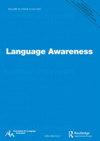二语学习者协作写作教育:探讨协作写作知识与写作产品之间的关系
IF 2.2
2区 文学
0 LANGUAGE & LINGUISTICS
引用次数: 5
摘要
虽然在过去的几十年里,关于第二语言或外语协作写作对共同写作产品的有效性的研究激增,但关于任务前准备是否以及如何最大化协作写作为学习者提供的语言学习机会的研究却很少。在元认知理论的指导下,本研究采用混合方法来调查一种方法对学生准备的影响,即教育他们合作写作知识。本研究比较了两个平行班级的合作写作成果(一个班级有明确的合作写作知识,另一个班级没有),以调查合作写作知识是否以及如何影响合作起草文章的复杂性、流畅性、准确性和质量。研究结果表明,接触过合作写作知识的学生在合作起草的文章的准确性、流畅性和质量(内容、组织、语法和词汇)方面都优于没有接触过合作写作知识的学生。研究结果还显示,从元认知策略(即规划、监控和评估自己的写作过程)的角度来看,协作写作知识会影响协作论文的质量。本文章由计算机程序翻译,如有差异,请以英文原文为准。
Educating L2 learners about collaborative writing: exploring the relationship between knowledge of collaborative writing and writing products
Abstract Although research about the effectiveness of second or foreign language collaborative writing for jointly written products has proliferated in the last few decades, there has been less examination of whether and how pre-task preparation could maximize the language learning opportunities that collaborative writing can afford learners. Informed by metacognition theory, this study used a mixed-methods approach to investigate the impacts of one technique for preparing students, namely educating them about collaborative writing knowledge. This study compared collaborative writing products from two parallel classes (one with exposure to explicit collaborative writing knowledge and one without) to investigate whether and how knowledge about collaborative writing affected the complexity, fluency, accuracy, and quality of collaboratively drafted essays. The findings indicated that students who were exposed to collaborative writing knowledge outperformed those who were not in terms of the accuracy, fluency, and quality (content, organization, grammar, and vocabulary) of their collaboratively drafted essays. The findings also revealed that knowledge of collaborative writing affects the quality of collaboratively drafted essays from the perspective of metacognitive strategies, namely planning, monitoring, and evaluating one’s own writing process.
求助全文
通过发布文献求助,成功后即可免费获取论文全文。
去求助
来源期刊

Language Awareness
Multiple-
CiteScore
3.70
自引率
10.00%
发文量
18
期刊介绍:
Language Awareness encourages and disseminates work which explores the following: the role of explicit knowledge about language in the process of language learning; the role that such explicit knowledge about language plays in language teaching and how such knowledge can best be mediated by teachers; the role of explicit knowledge about language in language use: e.g. sensitivity to bias in language, manipulative aspects of language, literary use of language. It is also a goal of Language Awareness to encourage the establishment of bridges between the language sciences and other disciplines within or outside educational contexts.
 求助内容:
求助内容: 应助结果提醒方式:
应助结果提醒方式:


